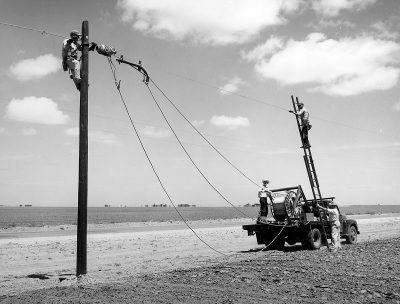
Rural electric cooperatives are uniquely positioned to go beyond energy and find innovative solutions to the challenges facing rural communities. Photo via Wikimedia Commons.
Out of the 353 U.S. counties that have suffered from persistent poverty over the past three decades, 93 percent are served by rural electric cooperatives. To help alleviate that poverty, some co-ops have developed programs to provide bill assistance and make clean energy affordable. While these programs are essential, there’s even more that co-ops can do to improve quality of life for their members.
Since their formation in the early 20th century, rural electric cooperatives have provided their communities not only with access to electricity but also to economic opportunity. This legacy of rural economic development, as well as the cooperative focus on serving members rather than maximizing shareholder profits, uniquely positions electric co-ops to go beyond energy and continue to find innovative solutions to the challenges facing rural communities today.
Expanding high-speed internet access
High speed, broadband internet still isn’t available in many of the communities served by rural electric co-ops. As of 2016, the Federal Communications Commission reported that 39 percent of people living in rural areas lacked broadband connectivity, compared to only 4 percent in urban areas. Yet reliable, high-speed internet is often necessary to access education and healthcare services as well as employment opportunities. The absence of affordable, fast internet limits local economic development, forcing some families to leave their homes and discouraging others from moving to rural towns.
To improve internet accessibility, an increasing number of electric cooperatives have begun to offer broadband to their members. The growth of co-op broadband service parallels the original electrification of rural communities, with electric cooperatives filling the void left by internet service providers unwilling to expand into the sparsely populated areas served by co-ops.
Electric cooperatives have an advantage when it comes to broadband services since they already own the poles and other infrastructure that can be used to expand communications networks. Especially as some co-ops are building out broadband to upgrade the electric grid and improve their own systems, it has become easier for co-ops to bring those services to their members as well.
Until recently, electric co-ops in Tennessee were prevented from providing communications services to their members. With the passage of the Tennessee Broadband Accessibility Act last year though, restrictions have been lifted. Tri-County Electric Membership Corporation, based in Lafayette, Tenn., is one co-op currently planning to offer fiber-to-the-home internet services to their members. The co-op has been awarded a loan from the U.S. Department of Agriculture as well as a grant from the Tennessee Department of Economic and Community Development to fund the project.
Keeping tradition alive with sustainable forestry
Agriculture and forestry have always played significant roles in the rural economy. Despite decreases in the sector’s prominence over the past 150 years, agriculture, forestry and related fields remain important parts of the economy in many places, still employing nearly one-tenth of all workers in rural counties.
However, land loss, particularly by African-American families, threatens this source of local wealth and economic diversification. Though land ownership has decreased across all races, black-owned land has declined at an even faster rate, from 15 million acres nationwide in 1910 to only about 3 million acres in 2007, due to discrimination and legal issues surrounding taxes and inheritance.
To address the continuing problem of land loss within its eastern North Carolina service territory, Roanoke Electric Cooperative operates the Sustainable Forestry and African American Land Retention program in cooperation with the USDA’s Natural Resources Conservation Service. The program is run through the co-op’s nonprofit partner the Roanoke Center. It provides local, small landowners with education and resources to help them manage their forestlands more sustainably, increasing both revenue and forest quality. By focusing on African American land retention, the program helps ensure that the economic benefits accrue locally and to those who have suffered the most from land loss.
Electric co-ops like Roanoke are well positioned to administer this kind of rural development program, even though it may appear unrelated, because of their familiarity with the local community and their relationship with their member-owners.
Local solutions to local problems
From their inception in the 1930s, electric cooperatives have worked to improve rural quality of life and confront systemic issues like poverty. As member-owned entities, co-ops can continue that work by responding to the shifting needs of their communities. Co-ops have a duty to their members to take advantage of the many resources available to implement innovative programs, including those provided by the USDA as well as state and regional funding.
Whether through broadband accessibility, forestry programs or clean energy opportunities, electric co-ops have both the ability and responsibility to develop creative solutions to today’s issues. With everything that electric cooperatives are capable of, you should ask yourself: what’s your co-op doing for you?
Contact Lauren Essick at lauren@appvoices.org in N.C. or Brianna Knisely at brianna@appvoices.org in Tennessee for more info on how to engage with your local electric cooperative.



Leave a Reply